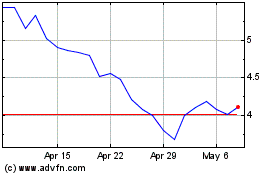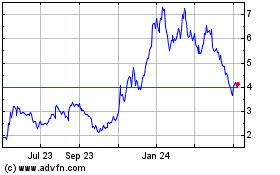Autolus Therapeutics plc (Nasdaq: AUTL), a clinical-stage
biopharmaceutical company developing next-generation programmed T
cell therapies, announces a poster presentation at the 2024
Lymphoma, Leukemia & Myeloma Congress being held October 16-19,
2024, in New York. These data suggest that adult patients with
relapsed/refractory B-Cell Acute Lymphoblastic Leukemia (r/r B-ALL)
achieve comparable outcomes irrespective of the timing of stem cell
transplant (SCT) pre or post obe-cel, suggesting no further benefit
of consolidative transplant based on this post-hoc analysis.
Additionally, obe-cel given as a sole treatment to patients with
lower Tumor Burden (TB) at Lymphodepletion (LD) was associated with
better outcomes.
“Building on the tumor burden-guided dosing
schedule presented at the recent Society of Hematologic Oncology
annual meeting, this subset analysis from the FELIX study continues
to differentiate obe-cel,” said Dr. Christian Itin, Chief
Executive Officer of Autolus. “These data from the FELIX
study suggest that Stem Cell Transplant post obe-cel treatment may
not add additional benefit in terms of event free survival gain
compared to obe-cel without transplant.”
Poster presentation:
Title: Outcomes of Adult Patients with
Relapsed/Refractory B-Cell Acute Lymphoblastic Leukemia (R/R B-ALL)
Treated with Obecabtagene autoleucel (obe-cel) with or without
Consolidative Allogeneic Stem Cell Transplantation
Session date and time: October 16-19,
2024Poster Number: P-008Presenting
Author: Jae H Park, MD, Memorial Sloan Kettering Cancer
Center, New York, NY, USA
Summary: Obe-cel is a CD19
autologous CAR T with a specialized design to improve persistence
and minimize severe toxicity. In the FELIX Phase 1b/2 study,
patients with relapsed refractory B-Cell Acute Lymphoblastic
Leukemia (r/r B-ALL) treated with obe-cel showed high remission
rates (78%) and a favorable safety profile. Studies of other
available CAR T-cell therapies have shown that adults with r/r
B-ALL may require consolidative stem cell transplantation (SCT) to
improve clinical outcomes. Consolidative SCT requires significant
healthcare resources and is associated with potentially severe
toxicity and non-relapse mortality. CAR T-cell treatment strategies
capable of minimizing requirement for consolidative treatments are
needed. In the study, patients received bridging therapy as
appropriate and underwent lymphodepletion (fludarabine, 4×30mg/m2;
cyclophosphamide, 2×500mg/m2), followed by tumor burden-guided
split dosing on Days 1 and 10 to a total target dose of 410×106 CAR
T-cells. The decision to proceed to consolidative SCT post-obe-cel
infusion was at the physician’s discretion. This post-hoc analysis
was conducted to explore baseline characteristics that may explain
SCT outcomes and identify risks.
At the data cut-off of February 7, 2024,
overall, 99/127 (78%) obe-cel infused patients achieved CR/CRi.
Eighteen patients underwent consolidative SCT, all in CR/CRi with
undetectable measurable residual disease (<10–4), and median
time to transplant of 101 days; 81 patients did not undergo
consolidative SCT. Those transplanted were generally younger
(median 35.5 vs 55.0 years), more likely Hispanic/Latino (50% vs
20%), less likely to have Philadelphia chromosome-positive disease
(11% vs 38%), had lower bone marrow (BM) blasts (median 32% vs
40%), and a higher rate of extramedullary disease (33% vs 16%) at
screening. Median number of prior therapies in both groups was two,
with a higher rate of blinatumomab exposure (67% vs 32%), and lower
rate of prior SCT (33% vs 51%) in transplanted patients. At current
follow-up (median 21.5 months), 49% (40/81) of responders without
SCT were alive and in remission, while only 28% (5/18) of those who
underwent SCT were alive and in remission. 44% (8/18) of those who
underwent SCT relapsed and/or died, and 28% (5/18) died due to an
adverse event. Consolidative SCT did not appear to improve EFS or
OS. In patients who did not undergo SCT post obe-cel infusion,
median event-free survival (EFS) (95% CI) was not reached for those
with <5% (n=24) and with 5–75% (n=36) BM blasts at
lymphodepletion, while it was 9 months (5.1, 22.1) for patients
with >75% (n=21) BM blasts.
At current follow-up, 49% of responders who did
not undergo consolidative SCT are in remission, compared with 28%
of those who underwent SCT. Although limited by relatively small
sample size, it appears those proceeding to SCT had a higher
proportion of high-risk features. Further studies are needed to
clarify optimal post-CAR T-cell management. Lower tumor burden at
lymphodepletion was associated with improved EFS in patients who
did not undergo SCT. These findings suggest potential for obe-cel
treatment without consolidative SCT in a large subgroup of
patients, and also suggest that reducing tumor burden prior to
lymphodepletion is crucial for improved outcomes.
About Autolus Therapeutics
plcAutolus is a clinical-stage biopharmaceutical company
developing next-generation, programmed T cell therapies for the
treatment of cancer and autoimmune disease. Using a broad suite of
proprietary and modular T cell programming technologies, Autolus is
engineering precisely targeted, controlled and highly active T cell
therapies that are designed to better recognize target cells, break
down their defense mechanisms and eliminate these cells. Autolus
has a pipeline of product candidates in development for the
treatment of hematological malignancies, solid tumors and
autoimmune diseases. For more information, please visit
www.autolus.com
About
obe-cel (AUTO1)Obecabtagene autoleucel (obe-cel) is a
B-lymphocyte antigen CD19 (CD19) chimeric antigen receptor (CAR) T
cell investigational therapy designed to overcome the limitations
in clinical activity and safety compared to current CD19 CAR T cell
therapies. Obe-cel is designed with a fast target binding
off-rate to minimize excessive activation of the programmed T
cells. In clinical trials of obe-cel, this “fast off-rate” profile
reduced toxicity and T cell exhaustion, resulting in improved
persistence and leading to high levels of durable remissions in
relapsed/refractory (r/r) Adult B-cell Acute Lymphoblastic Leukemia
(B-ALL) patients. The results of the FELIX trial, a pivotal trial
for adult B-ALL, have been submitted and accepted by the FDA with a
PDUFA target action date of November 16, 2024. In the EU a
regulatory submission to the EMA was accepted in April 2024, while
in the UK, an MAA was submitted to MHRA in July 2024. In
collaboration with Autolus’ academic partner, University College
London, obe-cel is currently being evaluated in a Phase 1 clinical
trial for B-cell non-Hodgkin lymphoma (B-NHL).
About obe-cel
FELIX clinical trialAutolus’ Phase 1b/2 clinical
trial of obe-cel enrolled adult patients with r/r B-precursor ALL.
The trial had a Phase 1b component prior to proceeding to the
single arm, Phase 2 clinical trial. The primary endpoint was
overall response rate, and the secondary endpoints included
duration of response, MRD negative complete remission rate and
safety. The trial enrolled over 100 patients across 30 of the
leading academic and non-academic centers in the United
States, United Kingdom and Europe. [NCT04404660]
Forward-Looking StatementsThis
press release contains forward-looking statements within the
meaning of the "safe harbor" provisions of the Private Securities
Litigation Reform Act of 1995. Forward-looking statements are
statements that are not historical facts, and in some cases can be
identified by terms such as "may," "will," "could," "expects,"
"plans," "anticipates," and "believes." These statements include,
but are not limited to, statements regarding Autolus’ development
and commercialization of its product candidates, timing of data
announcements and regulatory submissions, its cash resources and
the market opportunity for obe-cel. Any forward-looking statements
are based on management's current views and assumptions and involve
risks and uncertainties that could cause actual results,
performance, or events to differ materially from those expressed or
implied in such statements. These risks and uncertainties include,
but are not limited to, the risks that Autolus’ preclinical or
clinical programs do not advance or result in approved products on
a timely or cost effective basis or at all; the results of early
clinical trials are not always being predictive of future results;
the cost, timing and results of clinical trials; that many product
candidates do not become approved drugs on a timely or cost
effective basis or at all; the ability to enroll patients in
clinical trials; and possible safety and efficacy concerns. For a
discussion of other risks and uncertainties, and other important
factors, any of which could cause Autolus’ actual results to differ
from those contained in the forward-looking statements, see the
section titled "Risk Factors" in Autolus' Annual Report on Form
10-K filed with the Securities and Exchange Commission, or the SEC,
on March 21, 2024 as well as discussions of potential risks,
uncertainties, and other important factors in Autolus' subsequent
filings with the Securities and Exchange Commission. All
information in this press release is as of the date of the release,
and Autolus undertakes no obligation to publicly update any
forward-looking statement, whether as a result of new information,
future events, or otherwise, except as required by law. You should,
therefore, not rely on these forward-looking statements as
representing Autolus’ views as of any date subsequent to the date
of this press release.
Contact:
Olivia Manser+44 (0) 7780 471
568o.manser@autolus.com
Julia Wilson+44 (0) 7818
430877j.wilson@autolus.com
Susan A. NoonanS.A. Noonan
Communications+1-917-513-5303susan@sanoonan.com
Autolus Therapeutics (NASDAQ:AUTL)
Historical Stock Chart
From Nov 2024 to Dec 2024

Autolus Therapeutics (NASDAQ:AUTL)
Historical Stock Chart
From Dec 2023 to Dec 2024
